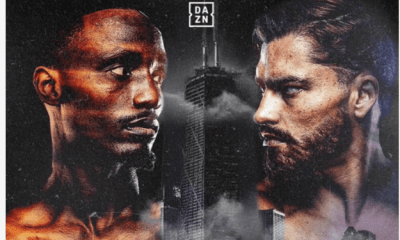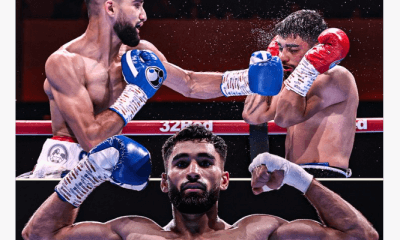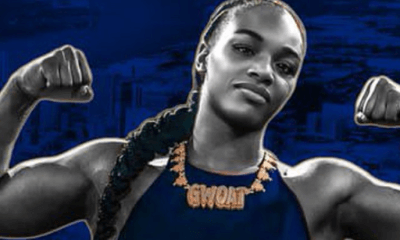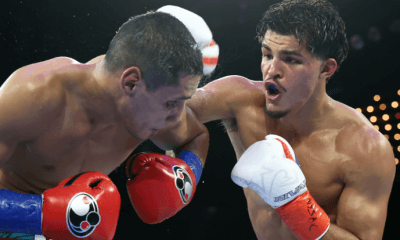Featured Articles
Super Featherweight Champ Tevin Farmer is Proof it’s Never Too Late to be Great
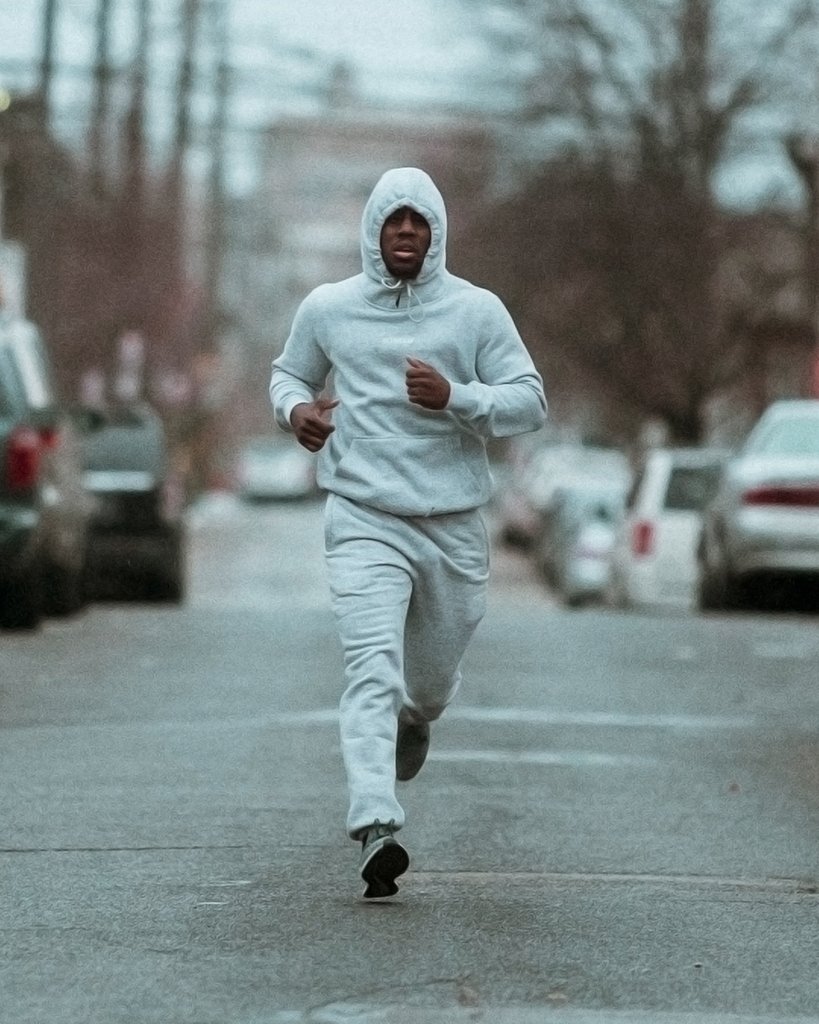
The story of Tevin Farmer’s career – his whole life, really – is printed in black letters on the front of his white T-shirt. The three-word message of hope it conveys, Never Too Late, applies to the late-blooming IBF super featherweight champion, of course, but it could apply to anyone who’s ever been rejected, disrespected, kicked when they’re down or told they’re not good enough to ever amount to anything.
Farmer (28-4-1, 6 KOs), who defends his 130-pound title against Ireland’s Jono Carroll (16-0-1, 3 KOs) in the DAZN-streamed main event Friday night at Philadelphia’s Liacouras Center, now knows what it’s like to be on top and it’s clear he enjoys the view. But his memories of the bad old days, which weren’t so very long ago, are still fresh enough to keep him from ever making the mistake of believing that the good times will last forever.
“I’m Never Too Late,” Farmer, from the hardscrabble North Philly neighborhood that has spawned so many great and might-have-been great fighters, said after a brief workout session at the Everybody Fights Gym on Tuesday afternoon that mostly served as a meet-and-greet with the media. “That’s what I stand for. That’s my slogan.”
Farmer’s slogan of choice is on the front, his autograph printed on the back of T-shirts that will be available to the public beginning on March 15, the day before he swaps punches with fellow southpaw Carroll, the IBF’s No. 4 super featherweight contender. Sales of the shirts in Farmer’s hometown and its surrounding areas aren’t apt to result in the same sort of mad rush by Phillies fans to purchase No. 3 jerseys that marked the team’s signing of high-priced free agent Bryce Harper, but he figures if somebody wants something bad enough and long enough, anything is possible.
“What I stand for is not only boxing,” the 28-year-old Farmer continued. “It could be for anything or anybody. You been in jail, or had a bad start in your career or life? You’re older, you’re 40, you ain’t where you want to be? Well, it’s never too late to make things right.
“I got my opportunity and I took advantage. That’s what can happen in life. It’s all about opportunity and timing. When your time comes, you got to take advantage because you never know if or when it’s gonna come again. Where I’m from, we face a lot of obstacles. That was nothing I wasn’t used to. I had a horrible start to my career. But I knew if I could get over that hump, I could get over anything. And you know what? I’m happy I went through that. It just made me better. Everything happens for a reason.
“I can’t complain or cry about it because what’s done is done. You got to move forward. That’s it. I’m blessed to have that mentality. I’m saying that like it’s really easy; I know it’s not easy. You got to build yourself up mentally to make it easy.”
Farmer’s tale of multiple travails faced and overcome would be fairly standard if all that it involved was the halting start of a pro career that saw him go 4-3-1 and be regarded, if he was regarded at all, as an “opponent.” He had a certain amount of natural talent, that much was obvious, but Farmer – who didn’t start boxing until he was 19 — was being paired with more experienced fighters for short money, a dead-end street from which there often is no escape to something better. Worse, Farmer was beginning to think of himself as a perpetual victim of circumstance, which caused him to do something he would never do today: take shortcuts in training because, hey, once you’re designated for the scrap heap, why dare to believe you can rise above all the negative perceptions?
But early defeats were not the worst of it. In March 2017 he nearly drowned while vacationing in Puerto Rico. A month later, he tore his right biceps, which required surgery, taking much of the luster off the 10-round unanimous decision he scored over Arturo Santos while basically fighting with one good arm. And if all that weren’t enough, in July he was shot through his right hand and was told by a doctor that it was inadvisable that he ever fight again.
The tsunami of misfortune in and out of the ring was compounded when a refocused and fully committed Farmer, who had begun to live the slogan he would turn into a personal mantra, took on Japan’s Kenichi Ogawa for the vacant IBF super featherweight title in Las Vegas on Dec. 9, 2017. The split decision awarded Ogawa was roundly criticized as a great injustice, still another slap to Farmer’s face and an outcome that might have crushed the spirit of a less resilient sort. It hardly seems to matter that the disputed victory for Ogawa was changed to a no-contest after he failed a drug test.
Promoter Lou DiBella, who by that time had taken a flier on Farmer in much the same way that a racetrack bettor plunks money down on a longshot he has a good feeling about, marvels at the way the recent addition to his stable of fighters stared down more disappointment with the same positive attitude that suggested he would again bear down and find a way to overcome.
“I love this kid,” DiBella said of Farmer. “He’s one of the best kids I’ve ever worked with. He has an incredible never-say-die attitude. I would never have believed in Tevin if he hadn’t believed so much in himself.”
Farmer didn’t have to wait long for a chance to make amends for the Ogawa debacle. He journeyed to Sydney, Australia, to take on popular Aussie Billy Dib for the IBF title Ogawa had been obliged to vacate. This time there would be no controversy as Farmer won a one-sided unanimous decision, by scores of 120-107, 119-108 and 118-109. Beaten in his home country from Sydney to Melbourne, Dib promptly announced his retirement.
After successful defenses against James Tennyson (KO5) and Francisco Fonseca (UD12), Farmer again will attempt to hold onto the world title he so cherishes against fellow lefthander Carroll, who claims he will have greater crowd support than the Philly fighter on a St. Patrick’s Day weekend card that is liberally dotted with Irish fighters, most notably 2012 Olympic gold medalist Katie Taylor (12-0, 5 KOs), the women’s WBA and IBF lightweight champion who takes on WBO titlist Rose Volante (14-0, 8 KOs) of Brazil in a unification matchup.
Carroll, whose black beard extends nearly down to his chest and might require a trim before he is allowed into the ring, claims to be unimpressed by Farmer’s inspirational back story or his overwhelming favoritism.
“I feel very confident about this fight,” Carroll said. “Tevin Farmer is a great champion but I’m ready to take that belt off him and be a great champion myself. I want to be Ireland’s next superstar. Winning this fight is what I need to do, and it’s exactly what I will do.”
Farmer smiles at Carroll’s brashness and expressions of confidence. He knows what it’s like to be the underdog, going into another fighter’s backyard to do what a lot of people say can’t be done. But now that he’s reversed that role, he has no intention of switching back again.
“Everybody’s gunning for him,” DiBella said of Farmer-the-target. “He represents their Super Bowl. They’re where he was a year and a half ago, and he knows it.”
So, does Farmer worry that Carroll will go all Never Too Late himself and pull off the upset?
“He can’t beat me, no way, shape or form,” Farmer said. “He’s no competition. I’m just hoping he comes in the best shape possible and gives me a good fight ’cause I’m beating guys too easy and I’m able to get back in the ring two months later. I want to be tested. I called all the champs (other titleholders at 130 are the WBC’s Miguel Berchelt, WBA’s Gervonta Davis and WBO’s Masayuki Ito) and I can’t get a fight with them, so I got to fight the people that’s next.”
Asked what it’s like to now be swimming with the sharks, a brimming-with-confidence Farmer said, “I am the shark.”
What he is, without question, is the busiest world champion in some time, the Carroll bout being his third title contest in four months. Nor is that hectic schedule apt to subside any time soon; Farmer says he hopes to fight six times in 2019, and DiBella and co-promoter Eddie Hearn of Matchroom Sport hope to provide him with a steady stream of challengers.
Interestingly, Farmer has never heard of another Philly guy, Freddie Pendleton, who traveled a similarly bumpy road from non-relevance to a world title. “Fearless” Freddie was a piddling 12-12-1 through the first 25 fights of his pro career, but he drew the attention of millionaire manager Edward Gersh and he continued to persevere until he won the vacant IBF lightweight title by outpointing Tracy Spann on Jan. 10, 1993.
“I should think there’s a lot of fighters like that,” Hearn said of Pendleton and the more accomplished Farmer, gifted fighters who needed to catch the kind of break that doesn’t always come along. “When Tevin started out, he wasn’t quite the fighter that he turned out to be, but he learned from those early losses and was clever enough to adapt. He obviously had natural ability. It’s really about mindset. His mindset now is phenomenal. A lot of fighters, if they went through what he went through, would have just packed it in or settled for being a journeyman. But Tevin knew he had more to give, and the turnaround has been massive.”
Another fact of the Tevin Farmer story is that, well, it’s such a great story. As is the case with Matchroom America stablemate Daniel “Miracle Man” Jacobs (35-2, 29 KOs), the IBF middleweight champion who overcame cancer and takes on WBA/WBC titlist Canelo Alvarez (51-1-2, 35 KOs) on May 4 in Las Vegas’ T-Mobile Arena, Farmer is a survivor who fans find it easy to root for.
“He has a brilliant story and it’s going to get better,” Hearn said. “He’s just scratching the surface right now, as far as where he can be and where he’s going to be. I’m very excited about him. I think he’s an outstanding fighter.”
Bernard Fernandez is the retired boxing writer for the Philadelphia Daily News. He is a five-term former president of the Boxing Writers Association of America, an inductee into the Pennsylvania, New Jersey and Atlantic City Boxing Halls of Fame and the recipient of the Nat Fleischer Award for Excellence in Boxing Journalism and the Barney Nagler Award for Long and Meritorious Service to Boxing.
Check out more boxing news on video at The Boxing Channel
To comment on this story in The Fight Forum CLICK HERE
-

 Featured Articles3 weeks ago
Featured Articles3 weeks agoResults and Recaps from New York Where Taylor Edged Serrano Once Again
-

 Featured Articles5 days ago
Featured Articles5 days agoThe Hauser Report: Zayas-Garcia, Pacquiao, Usyk, and the NYSAC
-

 Featured Articles3 weeks ago
Featured Articles3 weeks agoResults and Recaps from NYC where Hamzah Sheeraz was Spectacular
-

 Featured Articles4 weeks ago
Featured Articles4 weeks agoFrom a Sympathetic Figure to a Pariah: The Travails of Julio Cesar Chavez Jr
-

 Featured Articles2 weeks ago
Featured Articles2 weeks agoManny Pacquiao and Mario Barrios Fight to a Draw; Fundora stops Tim Tszyu
-

 Featured Articles3 weeks ago
Featured Articles3 weeks agoPhiladelphia Welterweight Gil Turner, a Phenom, Now Rests in an Unmarked Grave
-

 Featured Articles2 weeks ago
Featured Articles2 weeks agoArne’s Almanac: Pacquiao-Barrios Redux
-

 Featured Articles4 weeks ago
Featured Articles4 weeks agoCatterall vs Eubank Ends Prematurely; Catterall Wins a Technical Decision


